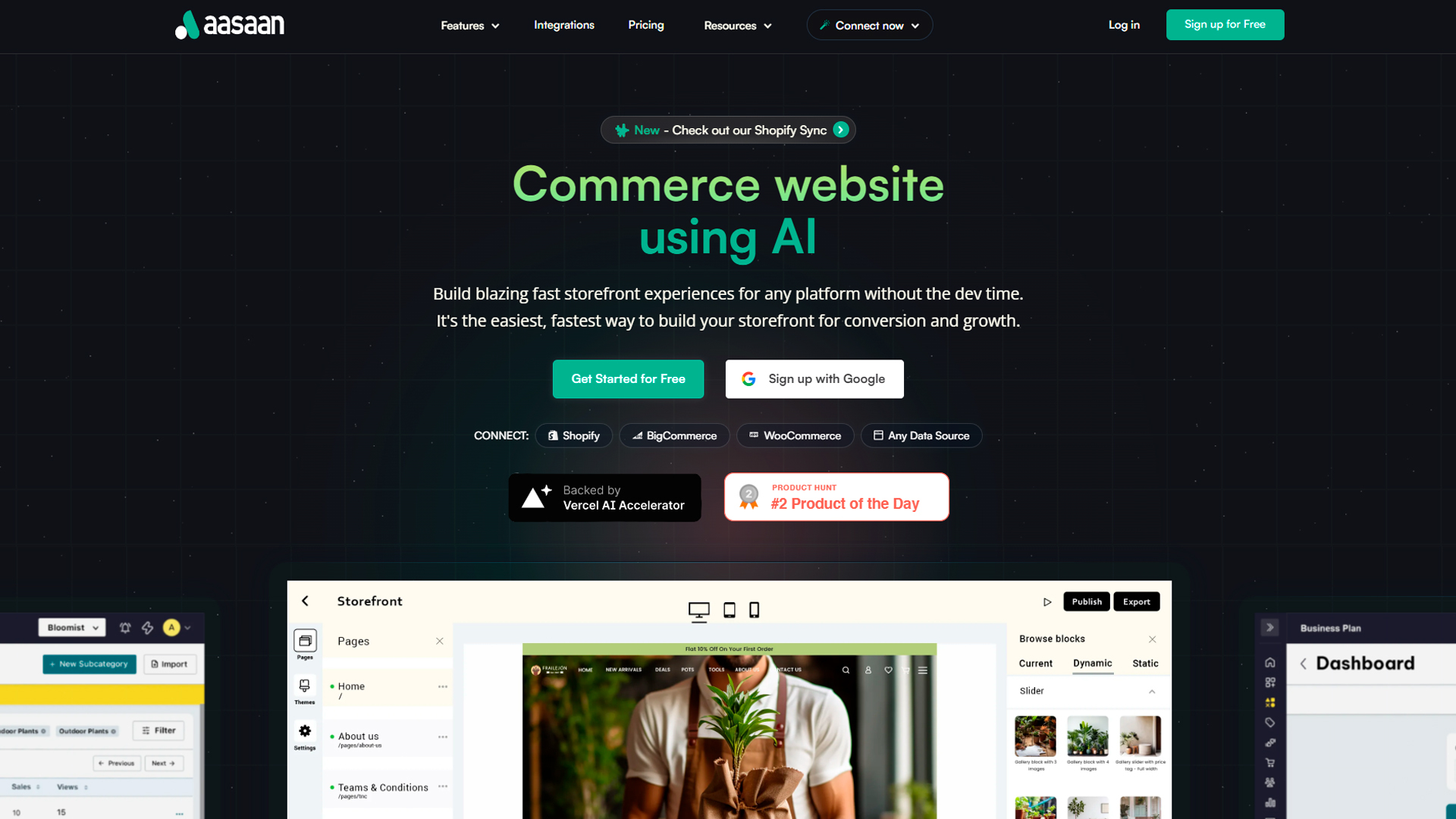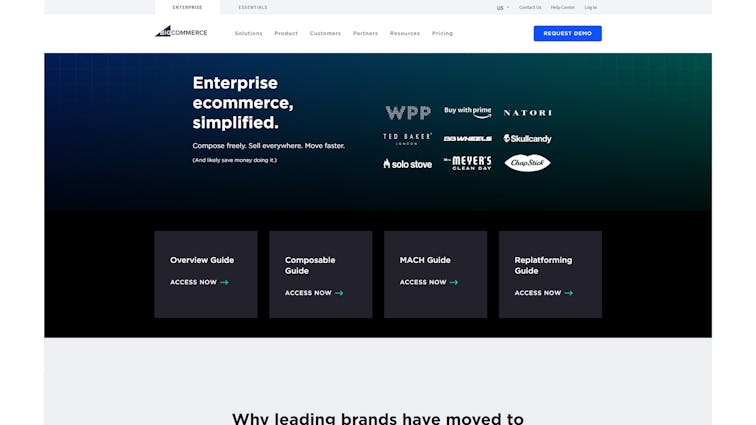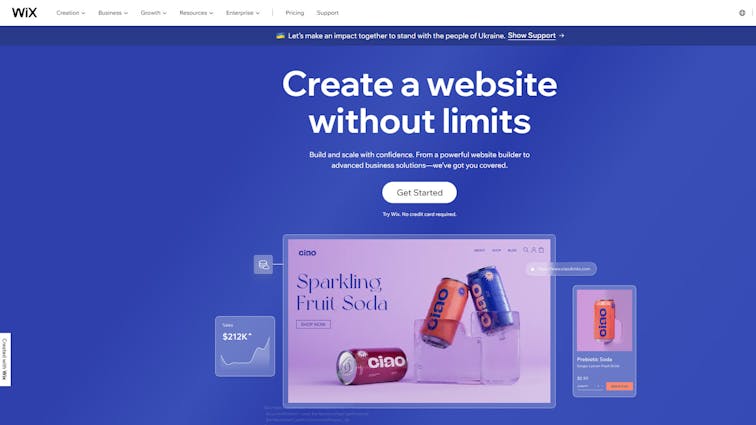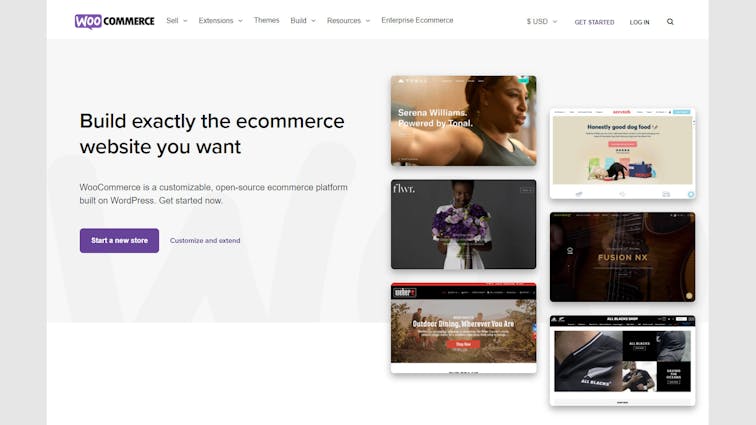
Top 8 Best Shopify Alternatives in India for 2025 - Find the Perfect competitors!
Are you looking for the best e-commerce platform to build your online store in India? Shopify is a popular choice, but it might not be the perfect fit for everyone.
With the rapid growth of e-commerce in India, it’s essential to explore various options to find the platform that meets your specific needs.
India’s e-commerce market is booming, with projections indicating significant growth. The market is expected to grow at a compound annual growth rate (CAGR) of 27% to reach $163 billion by 2026 (IBEF) (IMARC).
This surge is driven by increasing internet penetration, the rise of mobile shopping, and a growing preference for online shopping among consumers.
In 2023, India’s e-commerce revenue was estimated at $67.62 billion and is forecasted to reach $450.81 billion by 2030, with a CAGR of 31.13% (MAXIMIZE MARKET RESEARCH).
In this guide, we’ll explore the top 10 Shopify alternatives in India for 2025. Whether you’re a small business owner, a startup, or an established enterprise, these platforms offer a range of features to help you build and grow your online store efficiently.
Let’s dive into the best alternatives to Shopify and find the perfect e-commerce platform for your business needs.
What Is Shopify and How Does It Work?
Shopify is a leading e-commerce platform designed to help businesses of all sizes create, manage, and grow their online stores.
Launched in 2006, Shopify provides a user-friendly interface and a range of tools that simplify the process of setting up an online shop, even for those with limited technical expertise.
Here’s a brief overview of how Shopify works:
-
Store Setup: Users start by signing up and choosing a plan that suits their business needs. Shopify offers a variety of customizable templates, allowing users to design their store’s layout without needing coding skills.
-
Product Management: Adding products is straightforward. Users can upload product photos, set prices, manage inventory, and organize items into collections for easy browsing.
-
Payment Processing: Shopify integrates with multiple payment gateways, including Shopify Payments, PayPal, and major credit cards, ensuring smooth and secure transactions for customers.
-
Marketing and SEO Tools: The platform offers built-in SEO features, email marketing tools, and social media integrations to help drive traffic to the store and boost sales.
-
Order Management: Shopify’s dashboard allows users to manage orders, track shipments, and handle returns efficiently, ensuring a seamless customer experience.
-
Apps and Integrations: The Shopify App Store offers a vast array of apps that extend the platform’s functionality, from analytics and reporting to customer support and loyalty programs.
-
Support and Community: Shopify provides 24/7 customer support and a robust community forum where users can seek advice and share experiences.
Given its comprehensive features and ease of use, Shopify has become a go-to solution for many entrepreneurs and businesses worldwide.
However, Shopify is not the only option available, especially for businesses in India. Before exploring top Shopify alternatives.
let’s first understand the common reasons for dissatisfaction with Shopify, why people look for alternatives like Aasaan, BigCommerce or WooCommerce, and how to choose the best alternative.
For more information on Shopify and its features, visit the Shopify website.
Common Reasons for Dissatisfaction with Shopify
Some common reasons for dissatisfaction with Shopify include:
-
Cost: Shopify charges a monthly fee that can be a bit high for small businesses or startups. Additionally, there are transaction fees unless you use Shopify Payments.
-
Limited Customization: While Shopify offers a range of themes and apps, there can be limitations in terms of customization, especially for non-technical users.
-
SEO: Some users have reported that Shopify’s SEO features are not as robust or flexible as they would like.
-
Customer Support: Some users have reported dissatisfaction with Shopify’s customer support.
-
Complexity: For non-technical users, setting up and managing a Shopify store can be complex and daunting.
-
Lack of Certain Features: Depending on the specific needs of a business, Shopify might lack certain features or functionalities.
-
Expensive Add-ons: Many essential features require third-party apps, which can quickly add up and increase the overall cost.
Why People Look for Alternatives to Shopify?
People look for alternatives to Shopify due to a variety of reasons:
-
Cost: As mentioned earlier, the cost of using Shopify can be high, especially for small businesses or startups. Alternatives might offer lower prices or more cost-effective plans.
-
Customization: If a business has specific needs or wants more control over their online store, they might look for a platform that offers more customization options.
-
Features: Depending on the specific needs of a business, they might look for a platform that offers features that Shopify does not.
-
Ease of Use: Some people might find Shopify’s interface difficult to navigate or its setup process complex. They might look for a platform that is more user-friendly.
-
Customer Support: If a user has had a negative experience with Shopify’s customer support, they might look for a platform with better customer service.
-
Specific Business Needs: Some businesses might have specific needs that Shopify does not meet, such as the ability to sell digital products, the need for a specific payment gateway, or the desire for a certain type of website design.
How to Choose the Best Alternative to Shopify In India?
When choosing the best alternative to Shopify, consider the following factors:
-
Your Budget: Consider how much you are willing to spend on an ecommerce platform. Some platforms may have lower monthly fees but charge higher transaction fees, or vice versa.
-
Your Technical Skills: Some platforms are more user-friendly for non-technical users, while others offer more customization options but may require more technical knowledge.
-
Your Business Needs: Consider what features and functionalities are most important for your business. This could include things like SEO features, the ability to sell digital products, or specific payment gateways.
-
Customer Support: Look at the customer support options offered by each platform. This could include things like live chat, phone support, or the availability of helpful resources like tutorials and guides.
-
Scalability: Consider whether the platform can grow with your business. Some platforms are better suited for small businesses, while others can handle the needs of a large ecommerce store.
-
Reviews and Ratings: Look at what other users have to say about the platform. This can give you a sense of the platform’s strengths and weaknesses.
Remember, the best platform for you will depend on your specific needs and circumstances. It’s a good idea to take advantage of free trials or demos to test out different platforms before making a decision.
10 Best Shopify Alternative To Consider In India For 2025
1. Aasaan: The Next-Gen Best Shopify Competitor Overall
Aasaan, a Hyderabad-based startup, is considered a strong alternative to Shopify in India, offering a range of features that cater to the needs of small and medium-sized enterprises (SMEs) looking to establish their online presence.
Here’s why you might consider using Aasaan:

Why Should I Use Aasaan Platform?
- Ease of Use: Aasaan provides a drag-and-drop storefront builder, making it easy for users to set up their online stores without needing to write any code.
- Comprehensive E-Commerce Features: It supports all essential e-commerce functionalities, allowing businesses to sell products or services online effectively.
- Built-In Marketing Tools: Aasaan comes with integrated marketing tools such as email campaigns, discounts, and promotions to help attract and retain customers.
- Inventory Management: The platform offers efficient inventory management tools to keep track of stock levels and automate notifications for replenishment.
- Mobile Management: With Aasaan’s mobile app, managing your online store becomes accessible from anywhere.
- Detailed Analytics: Aasaan provides detailed analytics and reporting tools to gain insights into sales trends and customer behavior.
- Integration Capabilities: It supports seamless integration with various third-party services, enhancing its e-commerce capabilities.
- Inclusive Marketing and Pricing Strategies: Aasaan includes digital product promotion, bulk pricing, cross-selling, upselling, and email marketing without additional costs.
- Social Media and Shopping Feed Integration: The platform allows for easy setup of Instagram Shop and Google Shopping feeds with real-time synchronization at no extra cost.
- Mobile Optimization: Ensures that the online store is optimized for mobile devices, catering to the growing mobile e-commerce market.
- AI-Driven Content Creation: Incorporates advanced AI to streamline content creation, enabling the automatic generation of blogs and other digital content efficiently.
- Excellent Customer Support: Aasaan boasts a 5-star customer service team ready to assist users.
Pricing of Aasaan Platform
Aasaan’s pricing in India includes the following plans:
-
Standard Plan: ₹999 per month (billed monthly) or ₹583 per month (billed yearly). This plan is suitable for anyone looking to get started quickly and includes features such as mobile-optimized websites, fully integrated commerce, commerce analytics, 1 inventory location, 2 staff accounts, and 2 integrations.
-
Premium Plan: ₹2999 per month (billed monthly) or ₹1666 per month (billed yearly). This plan is designed for merchants and startups to help grow their business with branding. It includes additional features such as 3 inventory locations, 5 staff accounts, and 10 integrations.
-
Business Plan: ₹5999 per month (billed monthly) or ₹3333 per month (billed yearly). This plan is designed for advanced merchants and includes features such as unlimited integrations, backend API access, webhooks, and 5 inventory locations.
-
Enterprise Plan: Custom pricing for large-scale D2C brands that require unlimited scalability, greater control, and dedicated resources, essential for any thriving online business.
Aasaan also offers a 7-day free trial, allowing users to test the platform before committing to a subscription plan.
In summary, Aasaan stands out as a viable Shopify alternative in India, particularly for SMEs seeking a user-friendly, feature-rich platform to launch and manage their online stores.
Its emphasis on ease of use, comprehensive e-commerce features, and strong customer support make it an attractive option for businesses looking to expand their online presence.
2. BigCommerce: Best shopify alternatives india

BigCommerce is a leading cloud-based ecommerce platform designed for businesses of all sizes, from startups to established brands. It empowers users to create, manage, and scale their online stores without the complexities of self-hosted solutions.
Features:
- User-friendly store builder: BigCommerce offers a drag-and-drop interface for building a professional online store. You can choose from customizable themes and tailor the look and feel to your brand.
- Scalable product management: Manage a high volume of products efficiently. BigCommerce allows for stock level tracking, automatic reordering, and multi-channel inventory management.
- Built-in marketing tools: Boost sales with built-in features like SEO tools, email marketing functionalities, and discount code creation.
- Secure payment processing: Accept payments from customers worldwide with a wide range of supported payment gateways. BigCommerce ensures PCI compliance to safeguard customer financial information.
- Open API and app ecosystem: BigCommerce stands out for its open architecture. Developers can leverage the API to create custom functionalities, and the app marketplace offers a vast selection of extensions for additional features.
Pros:
- Ease of use: BigCommerce is known for its user-friendly interface, making it easy for beginners to set up and manage their stores.
- Scalability: The platform can adapt to your business growth, accommodating a high volume of products and transactions.
- Open architecture: The open API and extensive app marketplace provide great flexibility for customization and adding functionalities.
- Security: BigCommerce prioritizes security with PCI compliance for secure transactions.
- All-in-one solution: BigCommerce offers a comprehensive set of features to manage your entire online store operation.
Cons:
- Transaction fees: Similar to Shopify, BigCommerce charges transaction fees on sales. These fees can become a factor for high-volume businesses compared to Shopify alternatives.
- Customization limitations: While themes are customizable, extensive design changes might require coding expertise or developer assistance.
- Learning curve: BigCommerce offers more features compared to some basic ecommerce platforms, so there might be a slight learning curve for complete beginners.
Pricing:
BigCommerce offers several pricing plans tailored to different business sizes and needs:
- Standard Plan: Priced at $39/month, suitable for startups and small businesses.
- Plus Plan: Costs $105/month, designed for growing businesses needing more advanced features.
- Pro Plan: Starts at $399/month for businesses with less than $400k in online sales, with an additional $150/month for every $200k increase in sales beyond that threshold.
- Enterprise Plan: Custom pricing based on the customer’s online sales volume, providing scalable solutions and dedicated VIP service for large eCommerce businesses. Prices typically range from $1,000 to $15,000 per month.
All plans come with special credit card rates available via PayPal and Braintree, starting at 2.59% + $0.49 per transaction.
These rates are applicable to all BigCommerce plans, with eligibility requiring a United States-based business and a qualifying BigCommerce plan (Plus, Pro, or Enterprise).
Additionally, BigCommerce does not charge transaction fees on any of its plans, offering unlimited products, storage, and bandwidth.
This makes it a competitive choice among eCommerce platforms, especially for businesses looking for comprehensive features without the burden of transaction fees.
3. Wix: Website Building Made Easy

Wix is one of the popular sites similar to shopify website known for its user-friendly interface and drag-and-drop functionality. It empowers anyone, regardless of coding experience, to create and manage a professional-looking website.
Features:
- Drag-and-Drop Editor: The core of Wix is its intuitive drag-and-drop editor. You can easily add, arrange, and customize various elements on your website, from text and images to forms and videos.
- Wide Range of Templates: Wix offers a vast library of pre-designed templates for diverse industries and purposes, including businesses, blogs, portfolios, and online stores.
- Mobile-Responsive Design: Wix websites are automatically optimized for mobile devices, ensuring a seamless experience for visitors on any screen size.
- App Market: Expand your website’s functionalities with Wix App Market. You’ll find a wide range of apps for marketing, SEO, social media integration, and more.
- SEO Tools: Wix provides basic SEO tools to help improve your website’s ranking in search engines.
- Ecommerce Features: While not as robust as dedicated ecommerce platforms, Wix offers features for selling products online, including product listings, secure payment processing, and inventory management. (Limited in the free plan)
Pros:
- Easy to Use: The drag-and-drop editor and user-friendly interface make Wix a great choice for beginners with no coding knowledge.
- Free Plan Available: Wix offers a free plan that allows you to build a basic website and publish it with a Wix subdomain.
- Large Template Selection: With a vast collection of templates, you can easily find a starting point that matches your website’s purpose and style.
- Mobile-Friendly Websites: Out of the box, Wix websites are responsive and display well on all devices.
- App Market for Expansion: Enhance your website’s functionality with a variety of apps available in the Wix App Market.
Cons:
- Limited Design Customization: While Wix offers customization options, you might face limitations on layouts and functionalities compared to code-based website building.
- Difficulty in Switching Templates: Once you choose a template and build your website, it can be challenging to switch to a different template later.
- Wix Ads on Free Plan: The free plan displays Wix ads on your website. To remove them, you need to upgrade to a premium plan.
- Limited App Functionality (Free Plan): Many apps in the Wix App Market require a premium plan to unlock their full potential.
- Ecommerce Limitations: Wix’s ecommerce features are not as comprehensive as dedicated ecommerce platforms. Consider this if you plan on running a large online store.
Pricing:
Wix offers a freemium model with paid plans for additional features and functionalities. Here’s a basic breakdown:
- Free Plan: Limited features and storage, Wix ads displayed on your website.
- Connect Domain Plan (from $4.50 per month): Connect your custom domain name, remove Wix ads.
- Business Basic Plan (from $23 per month): Add online booking, accept payments online, access analytics tools.
- Business Unlimited Plan (from $27 per month): Increased storage and bandwidth, remove storage limitations for videos.
- Ecommerce Plans (from $27 per month): Specialized plans for online stores with features like product subscriptions and abandoned cart recovery.
Wix is a user-friendly and affordable option for building websites, blogs, and even simple online stores.
However, if you need complete design freedom or plan on running a large-scale online store, other website builders or dedicated ecommerce platforms might be more suitable.
4. WooCommerce: Turning WordPress into a Powerful eCommerce Platform

WooCommerce is a free, open-source plugin that transforms your WordPress website into a fully functional online store. It’s a popular choice for entrepreneurs and businesses of all sizes due to its flexibility and customizability.
Features:
- Product Management: Add, manage, and showcase a wide variety of physical and digital products with detailed descriptions, variations, inventory tracking, and shipping options.
- Payment Gateways: Integrate with popular payment gateways like Stripe, PayPal, and Amazon Pay to securely accept payments from customers worldwide.
- Tax Calculations: Automatically calculate and collect taxes based on your location and customer’s location.
- Shipping Options: Offer various shipping methods and integrate with real-time shipping carriers for accurate quotes.
- Coupons and Discounts: Create and manage promotional campaigns with coupons, discounts, and sales to boost sales.
- Inventory Management: Track stock levels, set low stock alerts, and automate reordering to avoid stockouts.
- Reporting and Analytics: Gain valuable insights into your store’s performance with detailed sales reports, customer behavior analysis, and product performance tracking.
- Extensibility: The true power of WooCommerce lies in its vast ecosystem of extensions (plugins and themes). You can add countless functionalities to your store, from marketing automation and SEO optimization to social media integration and advanced product filters.
Pros:
- Free and Open-Source: The core WooCommerce plugin is free to download and use, making it an attractive option for cost-conscious businesses.
- Highly Customizable: With a wide range of themes and extensions, you can tailor your online store’s look and feel to perfectly match your brand and meet your specific needs.
- Scalable: WooCommerce can grow with your business. Whether you’re starting with a few products or managing a large inventory, WooCommerce can handle it.
- WordPress Integration: Leverages the power and familiarity of WordPress for content management and website creation.
- Large and Active Community: Benefit from a vast community of users, developers, and resources for troubleshooting, customization guidance, and general support to create an online store that meets your needs.
Cons:
- Requires some technical knowledge: While WooCommerce is user-friendly, setting up and customizing your store might require some basic technical knowledge or the help of a developer for advanced features.
- Hosting and Domain Costs: While WooCommerce itself is free, you’ll need to pay for web hosting and a domain name to launch your online store.
- Ongoing Costs for Extensions: Many valuable extensions have premium versions with additional features, leading to potential ongoing costs.
Pricing:
- WooCommerce Core Plugin: Free
- Web Hosting: Starts from around $3- $10 per month (depending on your needs)
- Domain Name: Around $10- $20 per year
- WooCommerce Extensions: Free and Premium versions available (prices vary)
WooCommerce offers a powerful and customizable solution for building an online store. It’s a cost-effective option for those comfortable with some technical aspects and offers immense potential for growth.
However, if you prioritize a completely user-friendly, all-inclusive platform with minimal technical setup, other options like Shopify might be a better fit.
5. Instamojo : Best alternative for shopify In India.
Instamojo is an Indian company based in Bengaluru that provides eCommerce solutions, including websites, landing pages, integrated payments, shipping, and marketing tools for businesses.
It is designed to facilitate online transactions, making it easier for businesses to accept payments digitally.
Instamojo is particularly popular among small businesses and entrepreneurs for its ease of use and comprehensive suite of features .
Features of Instamojo
- Integrated Payments: Allows businesses to accept payments through various methods, including credit cards, debit cards, net banking, and wallets.
- Shipping Tools: Helps manage shipping logistics for physical goods sold online.
- Marketing Tools: Provides tools for promoting products and services online.
- E-commerce Websites & Landing Pages: Enables businesses to create professional-looking online storefronts and landing pages without extensive technical knowledge .
Pros of Instamojo
- User-friendly interface, making it accessible even for those without technical expertise.
- Quick setup for creating payment links, facilitating efficient sales processes.
- Secure payment infrastructure ensures safe transactions.
- Reliable customer support, addressing issues promptly.
- Suitable for small businesses and startups, offering a free version for initial exploration.
Cons of Instamojo
- Some users have reported delays in payments and high transaction fees.
- Limited functionality for downloading invoices or payment receipts from the seller’s dashboard.
- Bugs in the system and challenges with customer service have been noted by some users.
- Primarily focused on the Indian market, which may limit its utility for international businesses.
Pricing of Instamojo
Instamojo offers two main options for building an ecommerce website with their platform:
Free Online Store:
- This plan is completely free to use.
- You can create a basic online store with it.
- However, there are limitations. You’ll have:
- Instamojo branding on your store.
- Only 3 product images and 3 banner images allowed.
- A higher transaction fee of 5% + ₹3 per transaction (plus GST).
Paid Online Store Plans:
Instamojo offers three paid plans that provide more features and a lower transaction fee:
- Basic (₹3,999/year): This plan removes Instamojo branding, allows custom domain linking, and offers 19+ premium themes. The transaction fee remains at 5% + ₹3 per transaction (plus GST).
- Growth opportunities for your online business. (₹9,999/year): This plan offers the lowest transaction fee of 2% + ₹3 per transaction (plus GST). It also includes all the features of the Basic plan, along with features like enquiry forms, Facebook tracking pixel, and Google Analytics integration.
- Premium (₹1,999/month): This is the most feature-rich plan, offering everything in the Growth plan, plus advanced features like WhatsApp and Calendly add-ons, webhooks, custom code and widgets, and advanced analytics. The transaction fee is also 2% + ₹3 per transaction (plus GST).
For more information on Instamojo’s pricing for ecommerce websites, you can visit their website https://www.instamojo.com/pricing/.
In summary, Instamojo serves as a versatile and user-friendly platform for businesses aiming to establish or enhance their online presence.
While it excels in serving the Indian market, potential users should consider the reported cons, such as transaction delays and limited international support, before committing to the platform.
6. GoDaddy Ecommerce Website Builder
GoDaddy’s Online Store is a user-friendly website builder with built-in e-commerce functionalities. It’s ideal for beginners and small businesses looking for a quick and affordable way to set up an online store.
Features:
- Drag-and-drop website builder: Easy to use interface for building your online store without coding knowledge.
- Product management: Add product descriptions, images, variants, and inventory management tools to create an online store.
- Payment processing: Integrate with popular payment gateways like PayPal and Razorpay to accept payments securely.
- Shipping options: Configure shipping rates and options for your products.
- Marketing tools: Built-in features like social media integration and email marketing tools to promote your store.
- Mobile-friendly design: Responsive design ensures your store looks good on all devices.
- SEO tools: Basic SEO tools to help improve your store’s visibility in search engines.
Pros:
- Beginner-friendly: Easy to use interface makes it ideal for those with no coding experience.
- Affordable: Competitive pricing plans compared to some dedicated e-commerce platforms.
- All-in-one solution: Includes website builder, hosting, and basic e-commerce functionalities.
- 24/7 customer support: Get help whenever you need it.
- Free trial: Try the platform before committing.
Cons:
- Limited design flexibility: Compared to dedicated e-commerce platforms, GoDaddy offers fewer design customization options.
- Fewer advanced features: Lacks some advanced features like abandoned cart recovery or product reviews.
- Transaction fees: You’ll pay transaction fees depending on your plan (unless you use a third-party payment gateway).
- Limited scalability: May not be suitable for large businesses with complex inventory management needs.
Pricing in India (as of June 3, 2025):
- Free: This plan allows you to build a basic website but doesn’t include e-commerce functionality or a custom domain name.
- Basic (₹249/month): Ideal for personal use, allows connecting your domain and includes basic marketing tools. (Price with annual commitment)
- Standard (₹499/month): Suitable for new businesses, offers in-depth SEO and more marketing tools. (Price with annual commitment)
- Premium (₹699/month): Best for established businesses, includes advanced SEO and marketing tools. (Price with annual commitment)
- Ecommerce (₹999/month): Specifically designed for online stores, allows unlimited product listings and advanced inventory management. (Price with annual commitment)
Note: Prices are approximate and may vary depending on promotions and the length of your commitment.
GoDaddy’s Online Store is a good option for beginners and small businesses in India who want to set up a simple e-commerce website quickly and affordably.
However, if you need a highly customizable store with advanced features, you might consider dedicated e-commerce platforms like Shopify.
7. Square Online: Easy Ecommerce for Brick-and-Mortar Businesses

Square Online is an ecommerce platform offered by Square, a popular point-of-sale (POS) system provider. It’s designed to seamlessly integrate with Square’s POS system, making it a convenient solution for businesses with a physical storefront looking to establish an online presence.
Features:
- Simple Website Builder: Build your online store with a user-friendly drag-and-drop interface. No coding knowledge required.
- Inventory Management: Manage your online and in-store inventory seamlessly with Square’s integrated system.
- Sell Online and In-Person: Connect your online store to your Square POS system to manage sales and inventory across both channels.
- Built-in Marketing Tools: Utilize basic marketing features like email marketing tools and social media integration to promote your store.
- Payment Processing: Square Online integrates seamlessly with Square’s payment processing system for secure online transactions. (Transaction fees apply)
- Mobile-Friendly Stores: Square Online stores are automatically optimized for mobile devices.
- Customer Management: Track customer information and order history for improved customer service.
Pros:
- Easy to Use: The drag-and-drop builder and intuitive interface make it easy for beginners to set up and manage their online store.
- Integration with Square POS: For businesses already using Square for in-person sales, Square Online offers a seamless integration for unified inventory management and sales tracking.
- Affordability: Square Online offers competitive pricing plans, making it an attractive option for cost-conscious businesses.
- Mobile-Friendly Stores: Ensures a smooth shopping experience for customers on any device.
- Customer Management Features: Track customer data for improved marketing and sales efforts.
Cons:
- Limited Design Flexibility: Customization options might be limited compared to more design-focused ecommerce platforms.
- Limited Scalability: Square Online might not be ideal for businesses with a very high volume of products or complex sales needs.
- Focus on Square Ecosystem: While it integrates with other payment gateways, Square Online heavily leverages Square’s own services.
- Limited Marketing Features: The built-in marketing tools are considered basic compared to more advanced functionalities offered by other platforms.
Pricing:
- Free Plan: Allows you to create a basic online store with limited features and Square branding on your storefront. You can still process online payments through Square (transaction fees apply).
- Free Trial for Paid Plans: Square Online offers a free trial for their paid plans, allowing you to test the platform before committing.
- Paid Plans (Start around $12 per month billed annually): Unlock features like abandoned cart recovery, custom domain name, and more marketing tools. Transaction fees apply on all plans.
Square Online is a user-friendly and affordable solution for businesses, particularly those already using Square’s POS system, to establish an online presence. The seamless integration between online and in-store sales is a major advantage. However, if you require extensive design customization, advanced marketing features, or expect a high sales volume, other ecommerce platforms might be more suitable.
8. Dukaan: Top shopify alternatives in 2025
Dukaan is an Indian-based ecommerce platform designed to help businesses manage their online and in-person sales effectively.
It offers a user-friendly interface, robust tools, and a wide range of features to support businesses of all sizes.
Dukaan allows merchants to create and customize their online stores, manage products, inventory, payments, and shipping, and execute marketing campaigns.
It supports businesses across various sales channels and is available in multiple languages.
Features of Dukaan
- Unified Store Management: Dukaan provides a centralized platform to manage all aspects of an online store, including products, inventory, payments, and shipping.
- Multi-Channel Selling: Merchants can sell through various channels such as web, mobile, social media, and brick-and-mortar stores.
- Customization: Dukaan offers a drag-and-drop interface for easy customization, with hundreds of professional themes and templates available.
- Payment Integration: Dukaan Payments is the default payment option, offering competitive transaction fees. Merchants can also use third-party payment gateways.
- Shipping and Inventory Management: Dukaan allows for easy management of shipping and inventory, including integration with shipping providers like DHL Express, UPS, and USPS.
- Marketing and Analytics: Dukaan provides tools for creating and executing marketing campaigns, as well as in-depth analytics to track store performance.
- Commerce Apps: Dukaan has a vast app store with integrations for various services, such as product sourcing and store customization.
Pros of Dukaan
- Ease of Use: Dukaan is known for its intuitive interface, making it easy for merchants without technical expertise to set up and manage their stores.
- Robust Features: Dukaan offers a wide range of features to support businesses, including multi-channel selling, payment integration, and shipping management.
- Scalability: Dukaan is suitable for businesses of all sizes, from small startups to large enterprises.
- Security: Dukaan is certified Level 1 PCI DSS compliant, ensuring the security of customer data and transactions.
- Integration: Dukaan integrates with various platforms and services, including social media, Google, and other sales channels.
Cons of Dukaan
- Transaction Fees: Dukaan charges transaction fees, which can range from 0.5% to 2% depending on the plan and payment method used.
- Customization Limitations: Dukaan’s proprietary code limits advanced customization, requiring merchants to either learn the code or hire a developer.
- Plan Limitations: Dukaan’s pricing plans have varying features and capabilities, with advanced features like checkout customization available only on higher-tier plans.
- Additional Fees: Merchants may incur additional fees for using third-party payment gateways, POS hardware, and other services.
Pricing Plans
Dukaan offers several pricing plans, including:
- Free: ₹0 per month, suitable for small businesses and social media selling.
- Starter: ₹14,399 per year, providing standard features for growing businesses.
- Growth: ₹37,499 per year, offering advanced features for large businesses.
Dukaan is a versatile ecommerce platform that offers a range of features and tools to support businesses of all sizes. While it has its pros and cons, Dukaan’s ease of use, scalability, and robust features make it a popular choice for many merchants.
FAQ’S ON Best shopify alternatives in India
1. What Is Better Than Shopify?
While Shopify is a popular e-commerce platform, there are several other platforms that some businesses might find better suited to their needs. For instance, Aasaan is an Indian-based ecommerce platform that offers a mobile-first approach and is known for its simplicity and seamless store management. It is a good fit for businesses entering the world of ecommerce and looking for a user-friendly and scalable solution, WooCommerce is a free WordPress plugin that offers a lot of flexibility and customization options. BigCommerce is another alternative that offers a wide range of built-in features and doesn’t charge transaction fees. Magento, while more complex, offers a high degree of scalability for large businesses. The best choice depends on your specific business needs and technical capabilities.
2. Can I Move My Existing Shopify Store to a Different Platform?
Yes, you can move your existing Shopify store to a different platform to create an online store. Most e-commerce platforms have tools and services to help you migrate your store data. However, the process can be complex and time-consuming, especially for larger stores. It’s recommended to seek professional help or thoroughly research the process before proceeding.
3. Is there a free alternative to Shopify?
Yes, there are free alternatives to Shopify. One of the most popular is WooCommerce, a free plugin for WordPress websites. However, while the plugin itself is free, you may need to pay for web hosting, themes, and additional plugins. Other free or low-cost alternatives include PrestaShop and OpenCart, though these may require more technical expertise.
4. Is Shopify better or Dukaan?
Both Shopify and Dukaan are powerful e-commerce platforms, but they cater to different needs. Shopify is a globally recognized platform with robust features and integrations, making it suitable for both small and large businesses. On the other hand, Dukaan is a platform based in India that focuses on simplicity and ease of use, making it a good choice for small businesses and beginners. The best platform for you depends on your specific needs, budget, and technical expertise.
5. What app is similar to Shopify?
There are several apps similar to Shopify. BigCommerce, WooCommerce, and Magento are all powerful e-commerce platforms with their own mobile apps. Aasaan, Wix and Squarespace also offer e-commerce capabilities and have mobile apps for managing your store. Each platform has its own strengths and weaknesses, so the best choice depends on your specific needs.








